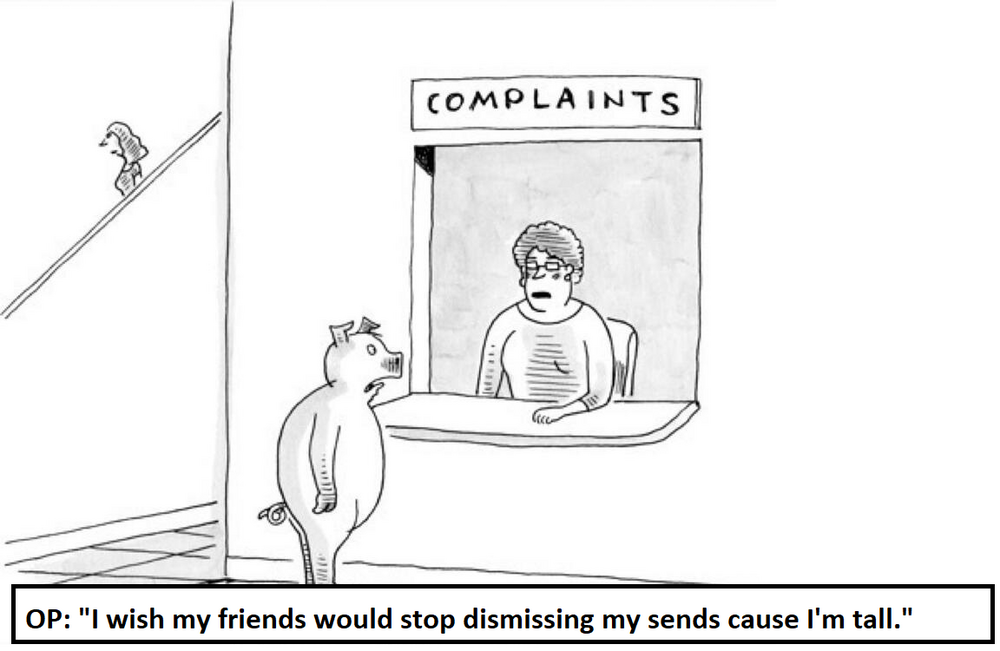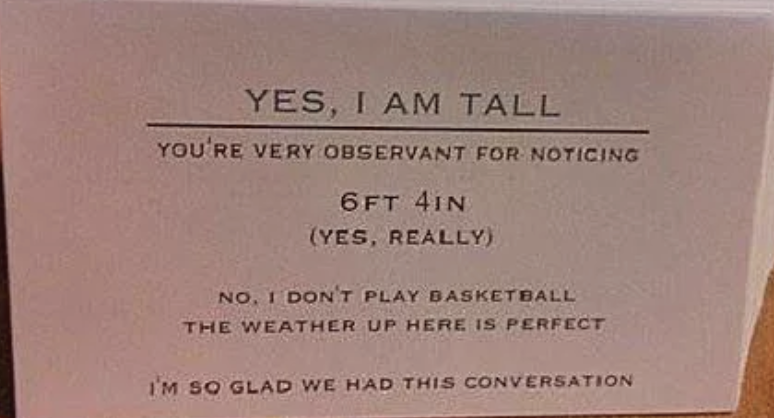Does being taller make climbing easier? Answering this question with data!
|
|
Hey everyone! As a tall climber myself, I've had this conversation countless times. Eventually, I got tired of hashing out the same ideas without either side having data to back up their theories. So I decided to change that. There's plenty of data on the height of pro climbers (just below the average height of the general population), but there's little to no data on how height relates to difficulty for beginner and intermediate climbers. I made a survey to gather this data and ran it by a few scientists to make sure the questions and method were good. I want to be clear. I'm not doing this to prove a point or settle an argument. While I have my own hypothesis, I'm just curious to see what the data will actually show. I'm approaching this with a very open mind, and I'm excited to see the results! I'll be posting them online when this is done! But to get good results, we need lots of (honest) responses. It should take about 3 minutes. If you want to help answer this question, please click this link: https://forms.gle/N23XY8wYhcdzFgK46 and fill out the survey! TL;DR: I made a survey to look at climber height vs. climbing difficulty. The link is above and it should take about 3 minutes to fill out. |
|
|
Kevin DeWeese wrote: Hey Kevin! I'd love to know which questions you're talking about. If it's the ones about "consistent grade" I agree. A lot of people are bad at estimating what grade they'd be able to send consistently with a few days of effort. But I also think that question is very important here. Since very tall climbers or very short climbers have such different body types from those of average height, they'll likely be able to climb certain routes that fit them well and are a much harder grade than what they'd usually be able to do. That's why I have that question in there. If you have a more objective way to word it, or if that's not the question you were referring to, I'd love to hear it! I'm no data scientist, and I'd love to hear feedback from those who know more than me! |
|
|
I seem to remember reading something from someone who tried to quantify climbing height advantage. From what I remember, 5'10" was the ideal height for climbing performance. |
|
|
Creed Archibald wrote: My guess is that somewhere around 5'10" will end up being the ideal height. But I could see a taller height being a bigger advantage when you're just getting started, or shorter height being a bigger advantage on really steep climbs. I wasn't able to find any studies on the subject, but if you know of one I'd love to see it! |
|
|
I imagine the height of the setter or first ascentionist is also relevant because they are generally the ones assigning the grades (or at least have the most influence on the grades), so if their average height is 5ft 10in, then it would make sense that people at the same height generally wouldn’t find a huge difference in difficulty. |
|
|
God damnit...another survey |
|
|
Jonathan Walker wrote: You are correct about that, but climbing grades are inherently oponion based and vary widely by locality. I agree with Kevin on this because of how inconsistent grades are. We like to pretend grades are objective, but they just aren't, and as such aren't a concrete way to measure something objective. |
|
|
When looking at a climber's geometry, there is height and there is ape index. Two climbers sharing the same measurement in one can differ greatly in the other. If we could use only one metric, I'd much prefer "reach", which is measured between the ground and the highest finger tip when one stands on tiptoe and reaches one arm up towards sky. Granted, most people know their height, but not their reach. Oh well... |
|
|
|
|
|
|
|
|
|
|
|
Kevin DeWeese wrote: Me thinks she doth protest too much. Kevin, how tall are you? ; ) Veering away from data and towards anecdote, Caldwell and Hill are pretty short and yet performed climbing miracles. Super tall climbers always seemed at a disadvantage to me but then there’s Andy Puhvel. Good to be tall when aiding, right? |
|
|
its all about ape index. Citing Tommy and Lynn means only that they are really good climbers and probably had to work much harder to send certain routes than other really good climbers who had a reach advantage. I certainly know of quite a few climbs where reach is massive. Two of our FA's its a full number grade if you can reach the key pocket without having to do an extra move. |
|
|
Trinidad Collier wrote: Your scientist friends definitely are not climbers. |
|
|
|
|
|
Christopher Clay wrote: Tommy Caldwell is short? I remember him being significantly taller than I am…I’d guess 5’10” or 5’11” for him. Also Lynn Hill is 5’2,” so just two inches shorter than the average woman in the US. Dean Potter was 6’4” |
|
|
No, being tall doesn't make us better climbers (quite the opposite in my case), but it does allow us to occasionally piss off shorter people by making some ridiculous reach. Height is no substitute for coordination, athleticism, strength to weight ratio. It's those 115 pound guys that you have to watch out for - they just float up the wall. |
|
|
I filed out your survey. While no survey is ever perfect, here are my thoughts on how it could be improved.
2. Why didn’t you ask about the gender? What if the answer is, for beginner gym climbers it’s advantageous to be taller than average for women, and shorter than average for men? Without knowing how many men vs women filled the survey, it would be hard to say how skewed it is. 3. I understand what you are trying to do with your question about highest grade vs consistent grade, but I would have asked it differently. Instead of asking about highest vs “consistent” grade, I would have asked, what is the highest grade you sent, and the LOWEST grade you didn’t send. I would also specify the recent time limit, e.g. within the past year. |
|
|
Height versus grade climbed and progression of grade has been analysed using the large 8a.nu database: http://www.alessandromasullo.com/blog/analysis-of-4-million-climbing-ascents/#maximum-grade-for-different-height Men climbing hardest tend to be 160-170cm tall (5' 3" to 5' 7"), women around 150cm. Most good climbers are below average in height. There are plausible biomechanical and also psychosocial explanations for this being causative but we can't be sure. I'm not sure how much of the data represents youths. Being a very tall man >205cm (6' 9") is also associated with climbing hard but I imagine this represents a tiny amount of data. Variation is huge so, overall, height is unimportant. Of course height or reach may be relevant for specific routes. We tend to remember when we can't make a reach and so the perception of importance of height becomes magnified. |
|
|
I used to say "6'4, plus 4, m@##%# $%#$3r!" Especially when I was drilling a new route. But now I often have to say, "Holy cow I feel heavy." As my son's grew and grew, they measured themselves, surpassing me and eventually forcing me to concede that I've shrunk a little to 6'3-ish. Though it often exceeds my grasp, at least I still have the reach. Don't forget that even though they're usually better than me, most climbers will still always be short. |
|
|
duncan... wrote: I have a really hard time with this analysis. The author claims that most advantageous heights are 160cm for men and 150 cm for women. That translates to 5’3” and 4’11” respectively. I am not aware of very many truly elite climbers who are that short (Laura Ragora/Jean-Paul Fine). For example, Ondra is 6’1”, and most elite males tend to be 5’6” to 5’10”. Janja and Brooke are 5’3” and 5’4” respectively. Lynn Hill is 5’2”. On a more anecdotal note, my partner is 4’11”. We mostly sportclimb and generally frequent sectors with a mix of routes going from 5.11 to 5.13. Not elite by any means, but in 30+ years of climbing, I can think of just two women we ran into who were shorter than my partner, so I find the 4’11” thing kind of questionable. |

 Continue with onX Maps
Continue with onX Maps Sign in with Facebook
Sign in with Facebook



























